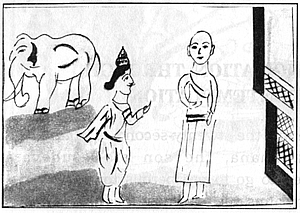Arishtnemi, the twenty-second Tirthankar, initiated Dhandhana, the son of Vasudeva. Dhandhana used to go to prosperous towns but he could not get any alms due to some impediment of his own Karma. Moreover, it also happened that whenever he went with other monks, they too did not get any food from the houses they visited. So he vowed that he would not take the food brought by the other monks.
One day, Lord Arishtnemi came to Dwarika. Vasudeva came to convey him, his regards and asked, "Gurudev, who is doing the hardest penance of all?" To this, Lord Arishtnemi replied, "Muni Dhandhana. He is practicing to overcome the Alaabh Parishah." "Where is he now?" asked Vasudeva. "When you will enter the town, you will see him," replied Lord Arishtnemi."
While entering the town, Vasudeva saw a monk coming towards him. He was thin, but his face was shining. He was Dhandhana. Vasudeva got down from the elephant and paid Vandana to the monk. By chance, Muni Dhandhana happened to come to a rich man's house for alms who gave him modakas. Taking the alms, Dhandhana came to upaashray and asked

Vasudeva got down from the elephant and paying Vandana to Dhandhana
the lord, "Have I destroyed my laabh antaraaya karma?" The lord replied, "No, whatever you have got today is due to the Vandana paid to you by Vasudeva." Seeing Vasudeva, the rich man was replete with devotion and so he offered you the alms."
Then Dhandhana thought to himself, "Whatever alms I got this day was due to the Vandana but I don't want to sustain my life on other's compassion. Now I cannot give these alms (Modaks) to other monks." Contemplating on this matter, Muni Dhandhana reached the stage of Keval gyaan and got emancipation.
Jain munis lead a stoical life. They have nothing of their own. They fulfill their needs by begging and requesting others for alms. All they possess is the virtue of remaining composed in any situation. Through this the path of salvation can be achieved.
 Sadhvi Vishrut Vibha
Sadhvi Vishrut Vibha
